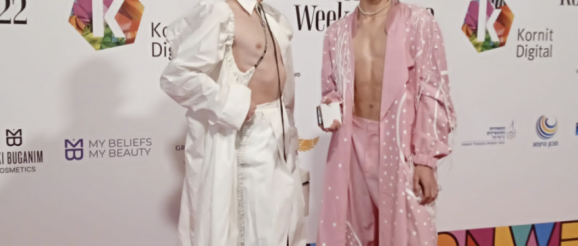Bringing together design, technology, and sustainable fashion

Kornit is a worldwide market leader in sustainable, on-demand digital fashion and textile production. They are changing the fashion industry with end-to-end workflow solutions that include digital printing systems, inks, and consumables. They are allowing their customers to push their creative boundaries sustainably with their fashion-forward solutions. Essentially, their end-to-end workflow solution liberates customers from the inefficient, costly, timely and wasteful production processes and supply chain constraints. Now, customers can have access to a scalable and modular ecosystem for on-demand decorated apparel and textiles, harbouring creativity while providing a frictionless pixel-to-parcel-to-doorstep production experience.
Rewriting the rules for fashion and textiles with virtual fashion
The fashion industry has its fair share of headaches. Not only is production an extremely inefficient process, but it is also impeccably wasteful. In a conversation with Geektime, Kornit’s Global Content Manager, Robert Zoch, gave us the lowdown on how destructive the industry can be. He explained to us that the fashion industry is one of the most water-intensive industries in the world. Water is used throughout the life cycle of every textile, from growing cotton plants or processing polyester and viscose. On the printing end, massive amounts of water are used in inks and printing processes such as spinning, dyeing, and finishing of fabrics. As it takes about 700 gallons of water to produce one cotton shirt (which is enough water for one person to drink at least eight cups of water per day for three-and-a-half years), the industry consumes around 79 billion cubic meters of water per year. What’s even more infuriating is that at its core, the nature of the fashion industry is wasteful; since overproduction is an industry norm, 10-30% of what is produced ends up going to waste. That is 21 million tons of textiles going to waste which equates to 28 trillion litres of water being wasted each year which is enough water to supply the global population’s drinking needs for 16 years. Clearly, the fashion industry’s use of water is simply unsustainable.
Moreover, the fashion industry also harms terrestrial ecosystems due to ecotoxicity. The industry uses so many different toxins and chemicals that end up in our environment, polluting our waters, and terrestrial organisms and plants. Such chemicals can have a grave effect on different ecosystems and their biodiversity.
Kornit’s technology is trying to change these wasteful norms. Zoch continues to explain that Kornit’s solution is free of pre-treatments, steaming and washing, which leads to less water consumption and waste. Their technology also reduces emissions, decreases water and air pollution, reduces energy consumption, and generally poses low biodiversity risks. For example, in a recent Life Cycle Assessment report, Kornit discovered that when compared to traditional screen printing, Kornit Atlas Max x digital printing system uses 93.8% less water and their Presto S system uses 95.63% less water. Kornit also disposes of effluent at the cycle’s end as hazardous material, separately from the municipal system to reduce pollution.
From Los Angeles, New York, and Milan to Tel Aviv – Kornit’s Fashion Week
This week, Kornit put on a slew of events for its Fashion Week, which unveiled vibrant runway collections that displayed the creative freedom associated with sustainable, on-demand fashion; the runway events showcased designer creativity across a broad array of collections that were created in just a few weeks, unlike typical fashion and textile production processes that take over six months. Kornit also introduced its new products and technologies set to change the fashion game and bring digital production to the mainstream. Top designers, retailers, brands, eCommerce players, and global investors came to experience what the new technologies have to offer. There was even an immersive runway showcase produced by worldwide fashion icon, producer, director, and entrepreneur Motty Reif.
One of the new technologies that Kornit introduced was their Apollo fully digital mass production direct-to-garment (DTG) platform, which addresses accelerated post-pandemic market trends for streamlined supply chains and production nearshoring. This is a game-changer for mass production that will offer a powerful alternative to screen printing. At the event, Kornit also unveiled its Atlas MAX Poly DTG production system, which is an industry-first high-volume digital decoration solution for polyester and polyester-blended apparel. The solution removes barriers associated with polyester production, ensuring high quality and durability while setting benchmarks for creativity and productivity. Since about 16% of global t-shirts are polyester, this is a great new opportunity for the fashion industry to really take advantage of the fabric; as polyester is often found in sports apparel and recreational sportswear, both promotional and sports brand markets can capitalize on Kornit’s solution with a wide range of colourful designs to inject new life into their apparel.
Kornit was founded in 2002 by Avi Sterling, Ganedi Rossin and Ofer Ben-Zur (CTO). It is currently run by Ronen Samuel (CEO). Its headquarters are in Israel but they have offices in the U.S., Asia Pacific, and Europe while employing over 880 people worldwide. It serves customers in more than 100 countries and states including Amazon, Adidas, Lululemon, and H&M.
